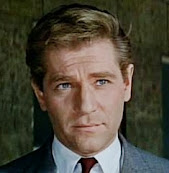 |
| George Segal as Quiller. |
He is quickly captured, injected with truth serum, and grilled about the location of the British headquarters. He divulges nothing of interest, but is mysteriously discarded rather than murdered. This is the first indication that Quiller is engaged in a cat-and-mouse game with his query.
Made in 1966, The Quiller Memorandum is one of several serious spy dramas made in the wake of the decade's hugely successful James Bond films. However, despite an impressive pedigree, including an all-star cast and an award-winning screenwriter, The Quiller Memorandum comes across as lightweight compared to The Spy Who Came in from the Cold (1965), The Ipcress File (1965), and The Deadly Affair (1967).
 |
| Senta Berger...as a spy? |
Screenwriter Harold Pinter, who adapted the novel The Berlin Memorandum, presents characters with less depth than cardboard cut-outs. Perhaps, his point is that spies lie so much to everyone that their "real" lives cease to exist. However, the end results of his efforts are characters without any character. Quiller is an cartoonish smart aleck who tosses off quips as he sits strapped in a chair facing torture or death. His attitude might work in a Bond knock-off, but obviously The Quiller Memorandum was intended as an anti-Bond spy film.
On the plus side, director Michael Anderson paints a haunting, noirish portrait of Berlin in the mid-1960s--from the crumbling buildings to the late night streets filled with lonely people. The gloom-ridden atmosphere is augmented by John Barry's dour score, which features Matt Monro singing "Wednesday's Child" (Mack David's lyrics include lines like "I am Wednesday's child, born to be alone").
Fans of Alec Guinness, Max Von Sydow, and Senta Berger may be interested in seeking out The Quiller Memorandum. However, if you're in the mood for a good 1960 spy drama, stick with The Spy Who Came in from the Cold, The Ipcress File, or Funeral in Berlin.








You had me at the "noirish" portrait of Berlin in the mid-sixties! I'm not a big spy fan, but young George Segal kinda does it for me, so I may check this one out if I happen to stumble upon it!
ReplyDeleteOne of the best films I have ever seen. If you believe that Harold Pinter's script has no redeeming social value, you have no taste, just a high IQ.
ReplyDelete